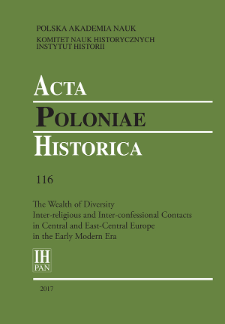- Search in all Repository
- Literature and maps
- Archeology
- Mills database
- Natural sciences
Advanced search
Advanced search
Advanced search
Advanced search
Advanced search

Object
Title: From Euphoria to Frustration: Institutionalizing Prognostic Research in the Polish People’s Republic, 1969–76
Subtitle:
Acta Poloniae Historica T. 116 (2017), Studies
Contributor:
Institute of History of the Polish Academy of Sciences ; Polish National Historical Committee
Publisher:
Instytut Historii Polskiej Akademii Nauk
Place of publishing:
Description:
Type of object:
Abstract:
In 1969 an interdisciplinary committee for long-term forecasting was created at the Polish Academy of Sciences. Together with the central planning authorities, statistical offices and every branch of government it constituted a system of prognostication which remained legally in place between 1971 and 1976. This article regards prognostication as an institutionalized experiment based on one of the key myths of modernity – that future events can be known and shaped. The genealogy of long-term forecasts in Poland dates back to pre-war experiences with state planning and transnational transfers of knowledge since 1956. After an outline of its pre-history, this article describes the construction and programmatic ideas of the prognostic system and asks how its functioning affected participants’ understandings of the future as a political category. Finally, this article makes the case that this state-run prognostication venture resulted in an amplitude of euphoria followed by frustration regarding future knowledge, which can be understood as an indirect but significant cultural symptom of the emerging political and economic crisis in the Polish People’s Republic beginning in 1976.
References:
Andersson Jenny and Rindzevičiūtė Eglė (eds.), Forging the Future: Transnational Perspectives on the History of Prediction (London et al., 2016).
Andersson Jenny, ‘The Great Future Debate and the Struggle for the World’, The American Historical Review, cxvii, 5 (2012), 1411–30.
Collier Stephen J., The Post-Soviet Social: Neoliberalism, Social Modernity, Biopolitics (Princeton and Oxford, 2011).
Hölscher Lucian (ed.), Die Zukunft des 20. Jahrhunderts. Dimensionen einer historischen Zukunftsforschung (Frankfurt am Main and New York, 2017).
Kolář Pavel, Der Poststalinismus. Ideologie und Utopie einer Epoche (Köln, Weimar and Wien, 2016).
Koselleck Reinhart, Vergangene Zukunft. Zur Semantik geschichtlicher Zeiten (Frankfurt am Main, 1979).
Plaggenborg Stefan, Experiment Moderne: Der sowjetische Weg (Frankfurt am Main et al., 2006).
Seefried Elke, Zukünfte. Aufstieg und Krise der Zukunftsforschung 1945–1980 (Berlin and Boston, 2015).
Relation:
Volume:
Start page:
End page:
Detailed Resource Type:
Format:
Resource Identifier:
oai:rcin.org.pl:68572 ; 0001-6829 ; 10.12775/APH.2017.116.10
Source:
IH PAN, sygn. A.295/116 Podr. ; IH PAN, sygn. A.296/116 ; click here to follow the link
Language:
Rights:
Creative Commons Attribution BY-ND 4.0 license
Terms of use:
Copyright-protected material. [CC BY-ND 4.0] May be used within the scope specified in Creative Commons Attribution BY-ND 4.0 license, full text available at: ; -
Digitizing institution:
Institute of History of the Polish Academy of Sciences
Original in:
Library of the Institute of History PAS
Projects co-financed by:
Access:
Object collections:
- Digital Repository of Scientific Institutes > Partners' collections > Institute of History PAS > Serials
- Digital Repository of Scientific Institutes > Partners' collections > Institute of History PAS > Institute Publications
- Digital Repository of Scientific Institutes > Partners' collections > Institute of History PAS > Institute Publications > Journals
- Digital Repository of Scientific Institutes > Partners' collections > Institute of History PAS > Institute Publications > Journals > Acta Poloniae Historica
- Digital Repository of Scientific Institutes > Literature > Journals/Articles
Last modified:
Sep 22, 2023
In our library since:
Feb 18, 2019
Number of object content downloads / hits:
561
All available object's versions:
https://rcin.org.pl./publication/85777
Show description in RDF format:
Show description in RDFa format:
Show description in OAI-PMH format:
| Edition name | Date |
|---|---|
| Becht, Lukas, From Euphoria to Frustration: Institutionalizing Prognostic Research in the Polish People’s Republic, 1969–76 | Sep 22, 2023 |

 INSTYTUT ARCHEOLOGII I ETNOLOGII POLSKIEJ AKADEMII NAUK
INSTYTUT ARCHEOLOGII I ETNOLOGII POLSKIEJ AKADEMII NAUK
 INSTYTUT BADAŃ LITERACKICH POLSKIEJ AKADEMII NAUK
INSTYTUT BADAŃ LITERACKICH POLSKIEJ AKADEMII NAUK
 INSTYTUT BADAWCZY LEŚNICTWA
INSTYTUT BADAWCZY LEŚNICTWA
 INSTYTUT BIOLOGII DOŚWIADCZALNEJ IM. MARCELEGO NENCKIEGO POLSKIEJ AKADEMII NAUK
INSTYTUT BIOLOGII DOŚWIADCZALNEJ IM. MARCELEGO NENCKIEGO POLSKIEJ AKADEMII NAUK
 INSTYTUT BIOLOGII SSAKÓW POLSKIEJ AKADEMII NAUK
INSTYTUT BIOLOGII SSAKÓW POLSKIEJ AKADEMII NAUK
 INSTYTUT CHEMII FIZYCZNEJ PAN
INSTYTUT CHEMII FIZYCZNEJ PAN
 INSTYTUT CHEMII ORGANICZNEJ PAN
INSTYTUT CHEMII ORGANICZNEJ PAN
 INSTYTUT FILOZOFII I SOCJOLOGII PAN
INSTYTUT FILOZOFII I SOCJOLOGII PAN
 INSTYTUT GEOGRAFII I PRZESTRZENNEGO ZAGOSPODAROWANIA PAN
INSTYTUT GEOGRAFII I PRZESTRZENNEGO ZAGOSPODAROWANIA PAN
 INSTYTUT HISTORII im. TADEUSZA MANTEUFFLA POLSKIEJ AKADEMII NAUK
INSTYTUT HISTORII im. TADEUSZA MANTEUFFLA POLSKIEJ AKADEMII NAUK
 INSTYTUT JĘZYKA POLSKIEGO POLSKIEJ AKADEMII NAUK
INSTYTUT JĘZYKA POLSKIEGO POLSKIEJ AKADEMII NAUK
 INSTYTUT MATEMATYCZNY PAN
INSTYTUT MATEMATYCZNY PAN
 INSTYTUT MEDYCYNY DOŚWIADCZALNEJ I KLINICZNEJ IM.MIROSŁAWA MOSSAKOWSKIEGO POLSKIEJ AKADEMII NAUK
INSTYTUT MEDYCYNY DOŚWIADCZALNEJ I KLINICZNEJ IM.MIROSŁAWA MOSSAKOWSKIEGO POLSKIEJ AKADEMII NAUK
 INSTYTUT PODSTAWOWYCH PROBLEMÓW TECHNIKI PAN
INSTYTUT PODSTAWOWYCH PROBLEMÓW TECHNIKI PAN
 INSTYTUT SLAWISTYKI PAN
INSTYTUT SLAWISTYKI PAN
 SIEĆ BADAWCZA ŁUKASIEWICZ - INSTYTUT TECHNOLOGII MATERIAŁÓW ELEKTRONICZNYCH
SIEĆ BADAWCZA ŁUKASIEWICZ - INSTYTUT TECHNOLOGII MATERIAŁÓW ELEKTRONICZNYCH
 MUZEUM I INSTYTUT ZOOLOGII POLSKIEJ AKADEMII NAUK
MUZEUM I INSTYTUT ZOOLOGII POLSKIEJ AKADEMII NAUK
 INSTYTUT BADAŃ SYSTEMOWYCH PAN
INSTYTUT BADAŃ SYSTEMOWYCH PAN
 INSTYTUT BOTANIKI IM. WŁADYSŁAWA SZAFERA POLSKIEJ AKADEMII NAUK
INSTYTUT BOTANIKI IM. WŁADYSŁAWA SZAFERA POLSKIEJ AKADEMII NAUK




































